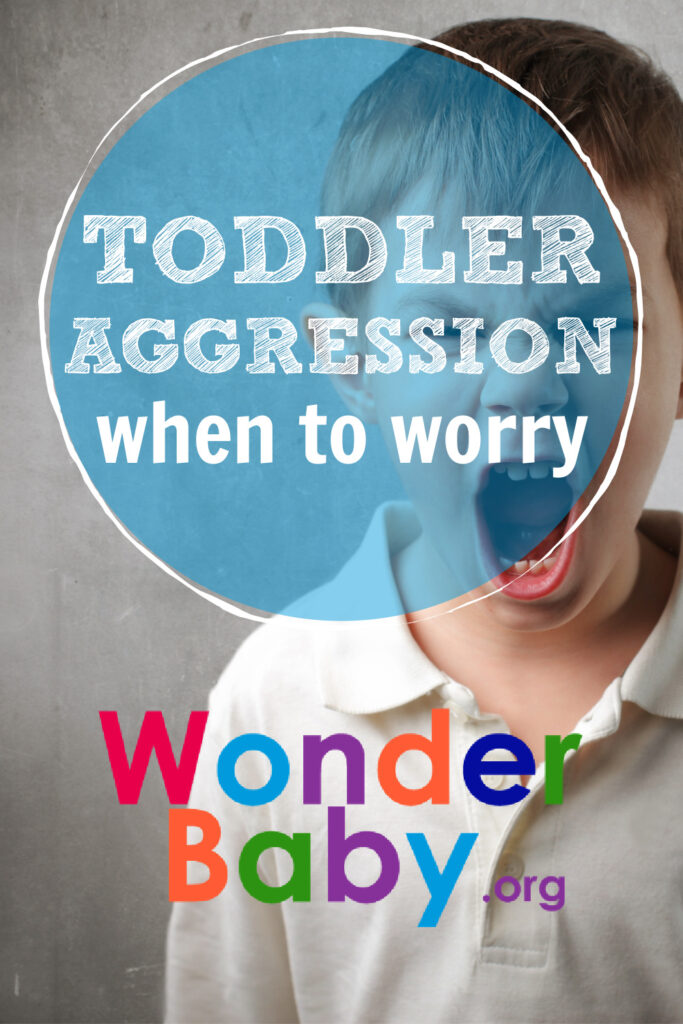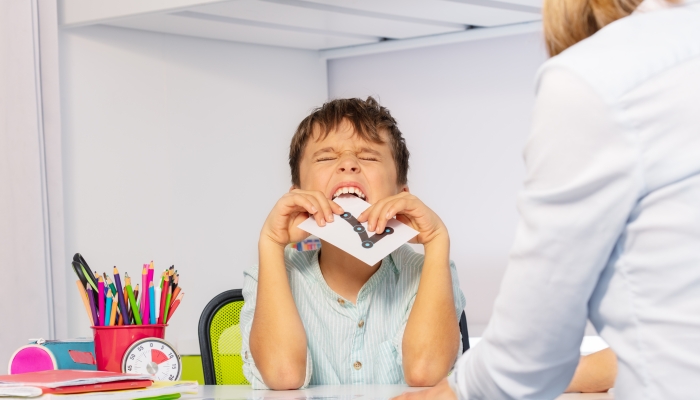Toddler Aggression: When To Worry

This post may contain affiliate links; please see our terms of use for details.
- Aggressive behaviors can be a normal part of your toddler’s development as they learn to handle difficult feelings.
- It’s important for parents and caregivers to remain calm and show their child how to deal with these emotions in a healthy way.
- A parent or caregiver should respond immediately to extreme aggression if a child is hurting themselves or others.
- Working with a specialist can help children learn to stay calm and reduce aggressive behavior.
Learning how to regulate emotions is difficult for even some adults to master. Your toddler is just starting to feel these swings in their emotions between the ages of 1 and 3, with 2 being the most common age for aggressive behaviors. But even preschoolers are still learning to regulate their emotions which can lead to acting aggressively. If you’re the parent of an aggressive child, it’s normal to wonder about toddler aggression, when to worry, how to correct it, and when to ignore it.
Sometimes anger can simply be due to a toddler not wanting to do something, such as going to bed at a certain time. Or it may be because you have a strong-willed toddler who is exercising their independence. Let’s take a closer look at the causes of your child’s aggressive behavior and how to respond to your toddler’s negative emotions to reduce aggression.
Why Do Toddlers Become Aggressive?
As your young child grows, their minds and bodies will change. Different emotions will manifest in different ways; things that seem minor to you can feel like the end of the world for your toddler. Emotions that you can understand, such as shame, embarrassment, and pride, may be unfamiliar and confusing for your toddler.
And since toddlers lack some of the self-control that older kids and adults have at this age, these intense emotions young children experience can lead to aggressive behavior.
For example, toddlers who are clingy or more dependent on you can become aggressive when you start to encourage their independence. Not allowing them to always be carried or held can lead to feelings of abandonment which can show up as anger. As an adult, you fully understand this is not a situation of abandonment. But your toddler is experiencing new emotions that they may not be able to express in a calm and acceptable way.

How Should I Respond to My Toddler’s Aggression?
Parents often struggle to deal with their child’s behavior the right way. Sometimes, the best thing you can do is take a deep breath and realize that your toddler is not intentionally being unruly or aggressive. They simply lack the understanding of how to deal with the strong and often unpredictable emotions they are feeling from one moment to the next. Below are some positive ways to respond to your toddler’s aggressive behavior.
1. Empathize with your toddler.
Many times, a child acts aggressively because they are unable to make their own choices. As an adult, you know what is best for your child. But try to put yourself in your child’s shoes. A toddler might feel like they’re being forced into situations they’re not happy with and are expressing their emotions in what seems to be the easiest way possible for them: aggression.
One of the easiest ways you can attempt to deal with an out-of-control toddler is by empathizing with them. Let them know you understand their anger and that you don’t like being forced to do things either. Try to let them know that if they do something they don’t want to do, such as getting ready to leave the house for an errand, they will be rewarded with something they do want, such as a snack or treat when they get home.
2. Discuss their feelings.
Talking about difficult feelings with toddlers can be challenging, but there are a number of ways you can try to make this process easier. Books are a great way to channel a child’s aggression in a different direction. And many books teach children to respond to negative emotions. Read a favorite story, but stop now and then to discuss the characters’ feelings.
For example, if a character is sad because their favorite toy is broken or lost, discuss with your toddler what emotions they might feel and what kind of behavior would be appropriate in this case. If your toddler is experiencing the same emotions as their favorite storybook character, it can be easier to get them to understand the right and wrong ways to express those feelings.
3. Help them express strong emotions.
The strong emotions many young children feel can sometimes be overwhelming for your toddler. Helping them express these strong emotions can go a long way in reducing aggressive behaviors when things don’t go their way.
When working on behavior strategies for an aggressive toddler, consider giving your child an alternative way to vent their emotions physically. This can help to prevent physical aggression. Show your child that, instead of screaming, kicking, punching, or biting, they can vent their anger by:
- Squeezing a toy or pillow.
- Jumping up and down.
- Ripping a piece of paper.
Teach your toddler that physically hurting themselves, other children, or animals is not acceptable. There are many ways they can release their anger without causing harm to themselves or others.
4. Use a distraction technique.
Sometimes, giving your child something else to focus on when they are angry can help diffuse their anger quickly. For example, if your child is hungry and wants a meal, they may become impatient and angry when it’s not provided immediately. This is perfectly natural. Being forced to wait while the food is cooked and then allowed to cool can just be too much for some young children.
Instead of having to deal with an aggressive child, teach them to redirect their anger into something else. So instead of just telling your toddler they have to wait, distract them by giving them a timer to watch. The visual of seeing the numbers tick down and the reward of hearing the bell when the time is over can be all it takes for your child to remain calm. Visual time trackers for kids can be a fun way to engage your child while they learn to wait for short periods of time.
5. Let your child make choices.
Sometimes, anger in a toddler can be due to them being told to do something. For example, maybe you’re getting ready to leave and you tell your toddler to get their coat before they go outside. This simple request from their parents can be very anger-inducing for some toddlers. Maybe they don’t want to get their coat, and being told to do something with no option can be very frustrating to some children.
Instead of telling your child to do something, give them a choice of things they can do. Give them the option of either getting their coat or helping you find your keys. Being able to choose what they want to do, out of two or three options, can not only prevent anger from arising but can also give your child a feeling of control in things that happen around them.

6. Have your child take a break.
Sometimes aggressive toddlers will calm down after taking some time alone—this doesn’t have to be a form of punishment. If your child continues to act aggressively after you’ve talked to them about it, bring them to a safe space where they can spend a few minutes alone. It’s important to stay calm so your child knows that you’re there to help them.
Especially if your child has a tendency to hit people or harm themselves when they’re upset, a few minutes alone (or with you) in a safe space can help your child to problem-solve so they can get back to playing with other children. And if your toddler is still too young to understand their behavior, you can take this time to practice breathing exercises until they’re calm and ready to play.
7. Praise good behavior.
When you have an aggressive toddler, keeping your child calm can start to feel like a constant struggle, and many parents worry about resorting to frequent time-outs. But it’s important also to remember to praise your child when they find an acceptable alternative to aggression—with or without your help.
Remember that children, especially toddlers, experience intense feelings and often lack the impulse control to handle them appropriately. So help your child with breathing exercises and remind them that hitting hurts, but don’t forget to tell them that they’ve done a great job when they calm themselves down.
How Common is Toddler Aggression?
Minor aggression as a toddler grows and ages is a normal part of their emotional development. It is almost impossible to find a toddler who hasn’t thrown a temper tantrum over something you may deem a minor offense. By the time a toddler reaches 2 years of age, their aggression will likely have peaked. As they continue to grow, they’ll start to learn better ways to cope with their emotions and feelings.
Is Toddler Aggression Ever Okay?
If your toddler is expressing their aggression in a non-harmful and non-destructive manner, it’s a safe outlet for them to use. Squeezing or punching a pillow or stuffed animals, ripping up a piece of paper, or stomping their feet on the floor are all safe and acceptable ways for a toddler to vent their frustration and aggression.
While the situation that causes anger in your toddler may seem minor to you, it’s essential to give your child time to feel and deal with their emotions on their own, as long as it’s done safely. One of the best ways for a child to develop self-regulating skills and impulse control is by giving them a chance to fully experience what they’re feeling—whether that’s anger, guilt, or embarrassment.

When Should I Seek Help with My Toddler’s Aggression?
Your toddler’s aggressive behavior should never reach a point where they’re physically harming themselves or others. Hitting, kicking, and biting should be curbed as soon as possible. Provide your child with a pillow or toy to punch instead. There are several positive ways to discipline your toddler and teach them that this behavior is unacceptable.
While some toddler aggression that seems to show up for no reason is a normal part of children learning to regulate and voice their emotions, you should worry if:
- Your toddler physically injures himself or another child, adult, or pet in the household.
- They are removed from public settings such as preschool due to aggressive behavior.
- Their outbursts last for weeks or are extremely frequent with high intensity.
If a toddler shows signs of self-harm or is physically injuring other kids, and you have been unable to curb their aggression, seeking assistance from a therapist or child development specialist may be the best course of action. Navigating through the world of new emotions and how to deal with them is difficult for children of all ages, and even some adults, so seeking professional help should be considered if it becomes too severe.
FAQs
While hitting your child is never an acceptable way to discipline a toddler for any reason, there are a variety of disciplinary options you can consider. These include placing your child in a time-out corner away from their toys, not giving them your attention for a short time, and calmly telling your child what is and is not acceptable behavior.
In many cases, absolutely. Seeking guidance from a child psychiatrist or child development specialist can help immensely when a toddler is acting out of control or their anger cannot be redirected safely at home. Getting new ideas for distraction and disciplinary measures from a therapist that specializes in toddler aggression can go a long way in improving emotional behavior.
Many parents worry that they’re doing something to cause their toddler’s aggression, but some amount of toddler aggression is perfectly normal. Still, it’s important to look at your own behavior since toddlers can learn aggression from their parents and other children. If you or other members of your family tend to overreact when you’re upset, they’ll learn this behavior from you. You should also limit your toddler’s exposure to violence in video games or movies.

Related Posts

Behavior
Understanding Intermittent Explosive Disorder in Children
Are you worried about your child’s unexpected aggression and explosive behaviors? Learn how to support a child with intermittent explosive disorder.

Behavior
5 Emotional Regulation Activities for Kids
Want to teach your child how to regulate emotions? Here are emotional regulation activities for kids that can help!

Behavior, Special Needs
5 Tips for Dining Out with Children Who Have Sensory Sensitivities
Worried about dining out with sensory sensitivities? Try these tips for less stress and more fun the next time you take your family out to eat.